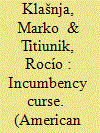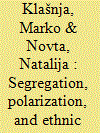|
|
|
Sort Order |
|
|
|
Items / Page
|
|
|
|
|
|
|
| Srl | Item |
| 1 |
ID:
153771


|
|
|
|
|
| Summary/Abstract |
We study how representation works in a context where accountability to voters is restricted because of term limits and accountability to parties is limited because of party weakness. Analyzing all Brazilian mayoral elections between 1996 and 2012 using a regression discontinuity design, we show that becoming the incumbent party results in large subsequent electoral losses. We theorize that the presence of term limits, combined with political parties to which politicians are only weakly attached, affects the incentives and behavior of individual politicians in such a way that their parties’ suffer systematic losses. A descriptive analysis of an original dataset on the career paths of Brazilian mayors suggests that our assumptions are an accurate description of Brazil’s political context, and we find support for three central empirical implications of our theoretical explanation. Moreover, based on an analysis of additional data from Mexico, Peru, Chile, Costa Rica, and Colombia, we show that the negative effects found in Brazil also exist in other democracies.
|
|
|
|
|
|
|
|
|
|
|
|
|
|
|
|
| 2 |
ID:
147317


|
|
|
|
|
| Summary/Abstract |
An index of ethnic segregation conveys the extent of spatial mixing of ethnic groups, whereas an index of ethnic polarization and similar diversity measures show the overall balance between the groups. We present a game-theoretic model of conflict in which local success of one ethnic group encourages attacks by its co-ethnics in neighboring areas. Conditional on conflict breaking out, we find that for highly ethnically polarized societies, increasing ethnic segregation decreases the incidence and intensity of conflict. In contrast, in societies with low ethnic polarization, increasing segregation increases conflict. This is because segregation and polarization jointly determine the spread of conflict, an important channel that has been neglected previously. We find strong empirical support for model predictions in two very different conflicts: Hindu–Muslim riots in the 1980s and 1990s in India and the Bosnian Civil War from 1992 to 1995.
|
|
|
|
|
|
|
|
|
|
|
|
|
|
|
|
|
|
|
|
|